In graphics: Britain's referendum on EU membership
Feb 24th 2016, 13:18 by The Data Team
ON FEBRUARY 20th David Cameron, Britain's prime minister, set June 23rd as the date for a referendum on the country's membership of the European Union. His announcement followed a protracted renegotiation of the current conditions of Britain's membership at a summit in Brussels. The move immediately prompted government ministers to declare their backing for either the "remain" or "leave" campaigns. Mr Cameron strongly believes in the benefits of continued EU membership, but a handful of high-profile MPs, including justice secretary, Michael Gove, and London's mayor Boris Johnson, have pledged support for the "out" campaigners. In early 2015 the chances of "Brexit"— Britain departing from the European Union—seemed remote. Today, largely because of Europe's migration crisis and the interminable euro mess, the polls have narrowed. Some recent surveys even find a majority of Britons wanting to leave.
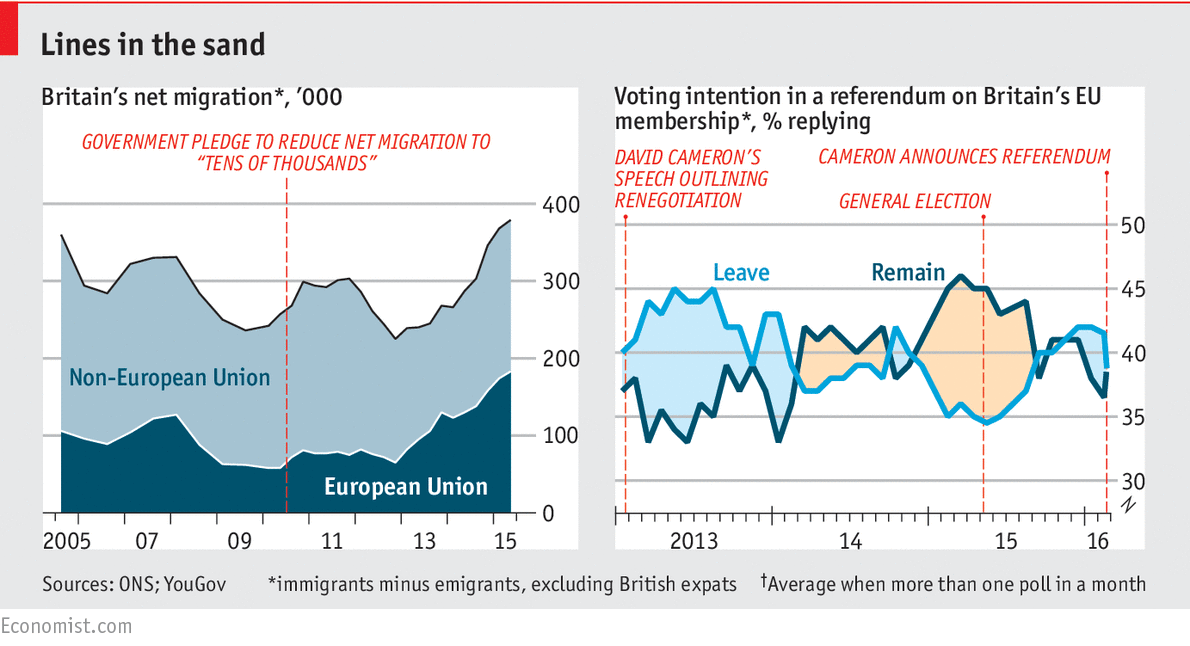 Mr Cameron is himself partly responsible. Although he has repeatedly urged his party to stop "banging on about Europe", his Eurosceptic backbenchers, scared witless by the rise of Nigel Farage's virulently anti-EU UK Independence Party (UKIP), have constantly hassled him to adopt a tougher line with Brussels. His response has generally been to appease them. One early morsel he threw them was the 2011 European Union Act, which requires any EU-wide treaty that passes substantive new powers to Brussels to be put to a British referendum. That sounded like a big concession, but no new treaties were then in prospect. In January 2013, Mr Cameron promised that, if the Tories were re-elected in May 2015, he would renegotiate Britain's membership and hold an in-out referendum by the end of 2017.
Mr Cameron is himself partly responsible. Although he has repeatedly urged his party to stop "banging on about Europe", his Eurosceptic backbenchers, scared witless by the rise of Nigel Farage's virulently anti-EU UK Independence Party (UKIP), have constantly hassled him to adopt a tougher line with Brussels. His response has generally been to appease them. One early morsel he threw them was the 2011 European Union Act, which requires any EU-wide treaty that passes substantive new powers to Brussels to be put to a British referendum. That sounded like a big concession, but no new treaties were then in prospect. In January 2013, Mr Cameron promised that, if the Tories were re-elected in May 2015, he would renegotiate Britain's membership and hold an in-out referendum by the end of 2017.
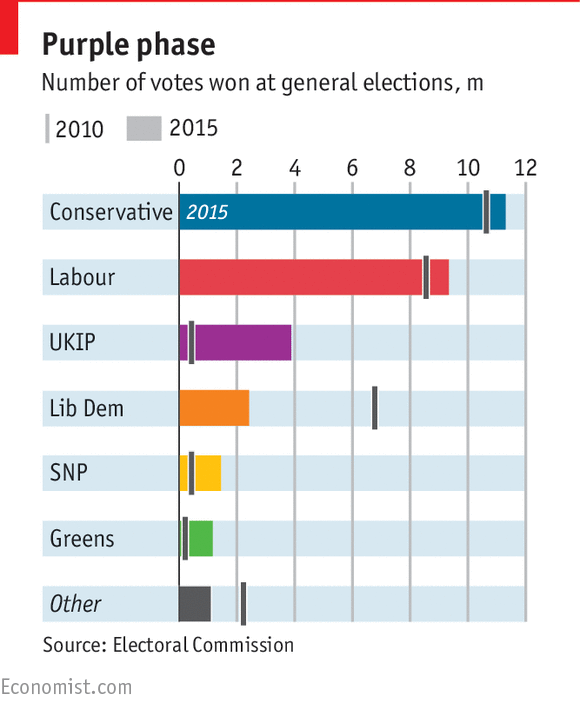 Following his election victory in May 2015, the prime minister claimed to have embarked on a renegotiation to fix what he says is wrong with the EU. Yet he was deliberately vague about what changes he wants, partly for fear that if his shopping list leaks Eurosceptics in his own party will rubbish it as inadequate. At the European summit on October 15th-16th, however, he was told by his fellow heads of government to produce a list of precise demands in November if there was to be any chance of the negotiations being concluded, as he at one time hoped, at the December European summit. He did produce a list of demands but a deal still eludes him. The prime minister is now hopeful of getting an agreement by the end of February.
Following his election victory in May 2015, the prime minister claimed to have embarked on a renegotiation to fix what he says is wrong with the EU. Yet he was deliberately vague about what changes he wants, partly for fear that if his shopping list leaks Eurosceptics in his own party will rubbish it as inadequate. At the European summit on October 15th-16th, however, he was told by his fellow heads of government to produce a list of precise demands in November if there was to be any chance of the negotiations being concluded, as he at one time hoped, at the December European summit. He did produce a list of demands but a deal still eludes him. The prime minister is now hopeful of getting an agreement by the end of February.
The two campaigns, "Britain Stronger in Europe" and "Vote Leave", that are likely to form the offical lobby groups for each side in the referendum have set out their positions on the main topics that will form the basis for the referendum (see table).
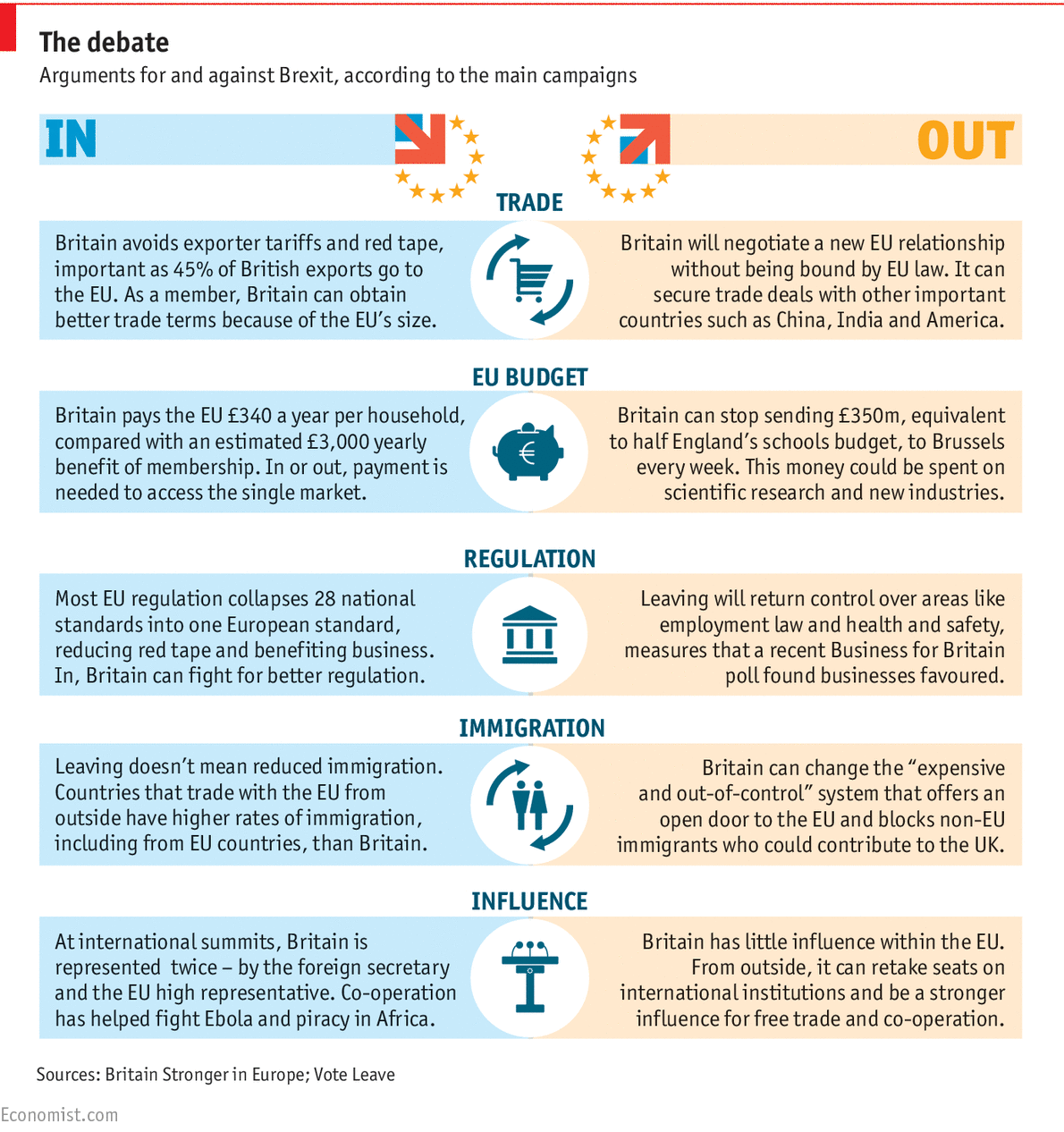 Britain's uneasy relationship with the European Union has a long history. In 1950 only 10% of Britain's exports went to the six countries that formed the European Coal and Steel Community (ECSC). Concerns about the Commonwealth, the welfare state and sovereignty led it to miss the boat at the Messina conference in 1955, when the ECSC countries decided to form the European Economic Community, the precursor of today's EU. Instead, in 1960 Britain cajoled six much smaller European countries into forming the European Free-Trade Association (EFTA). But in 1961 a Tory government under Harold Macmillan, impressed by the EEC's superior economic performance, decided to submit the first of several British applications to join. Britain eventually joined in 1973 under Edward Heath.
Britain's uneasy relationship with the European Union has a long history. In 1950 only 10% of Britain's exports went to the six countries that formed the European Coal and Steel Community (ECSC). Concerns about the Commonwealth, the welfare state and sovereignty led it to miss the boat at the Messina conference in 1955, when the ECSC countries decided to form the European Economic Community, the precursor of today's EU. Instead, in 1960 Britain cajoled six much smaller European countries into forming the European Free-Trade Association (EFTA). But in 1961 a Tory government under Harold Macmillan, impressed by the EEC's superior economic performance, decided to submit the first of several British applications to join. Britain eventually joined in 1973 under Edward Heath.
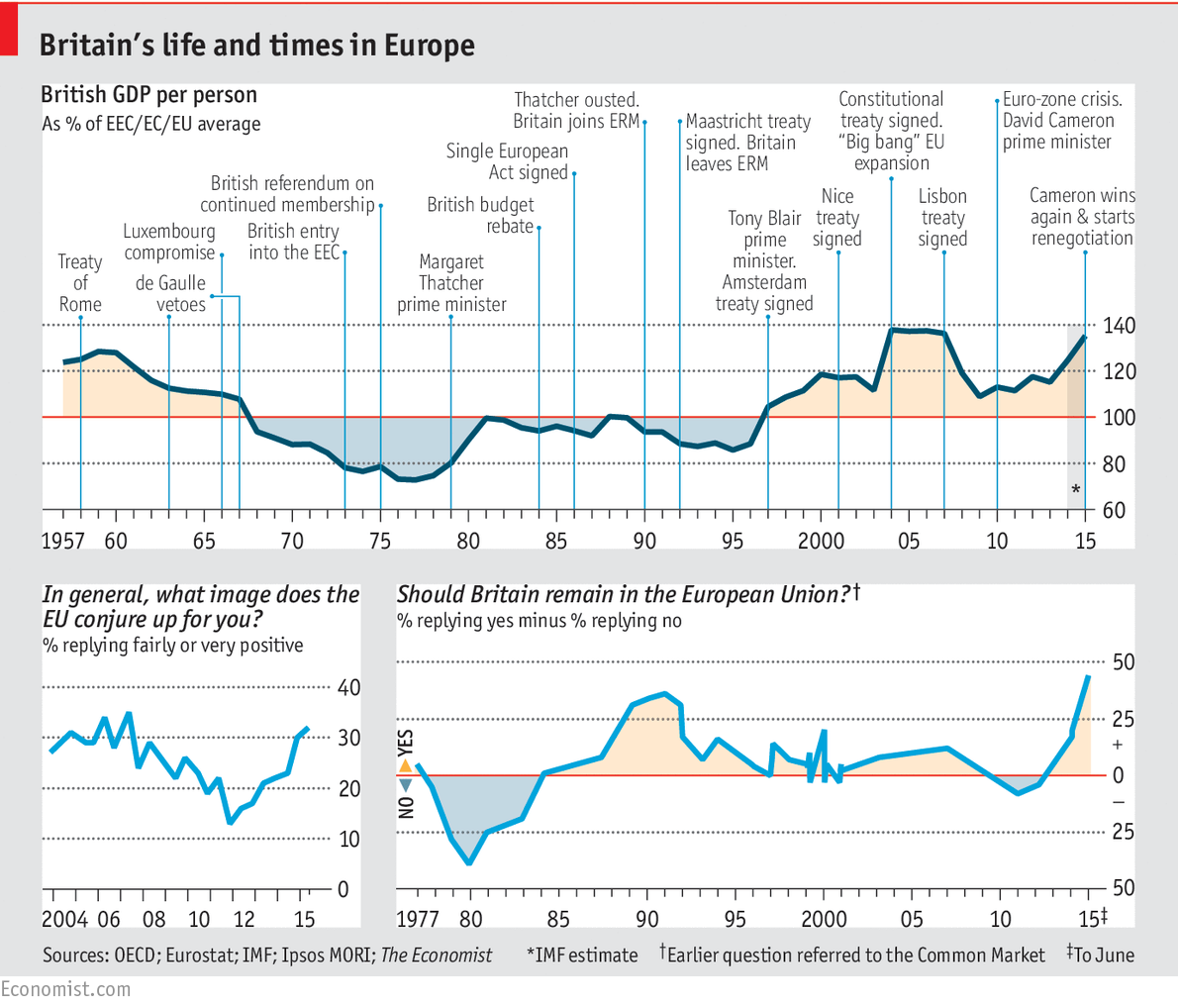 British trade with other EU countries has risen rapidly since 1973, though as the European economy has slowed, its share of the total is declining (the EU now takes over 51% of British exports of goods, and close to 45% if services are added in). Yet whether Britain is in or out, the EU will be a key partner. For non-members such as Norway or Switzerland, trade with the EU makes up a bigger share of the total than it does for Britain. The effects of EU membership on trade patterns are difficult to measure, but John Springford of the Centre for European Reform, a London-based think-tank, and colleagues have carried out a modelling exercise which concluded that Britain's trade with the rest of the EU was 55% greater than it would have been if outside
British trade with other EU countries has risen rapidly since 1973, though as the European economy has slowed, its share of the total is declining (the EU now takes over 51% of British exports of goods, and close to 45% if services are added in). Yet whether Britain is in or out, the EU will be a key partner. For non-members such as Norway or Switzerland, trade with the EU makes up a bigger share of the total than it does for Britain. The effects of EU membership on trade patterns are difficult to measure, but John Springford of the Centre for European Reform, a London-based think-tank, and colleagues have carried out a modelling exercise which concluded that Britain's trade with the rest of the EU was 55% greater than it would have been if outside
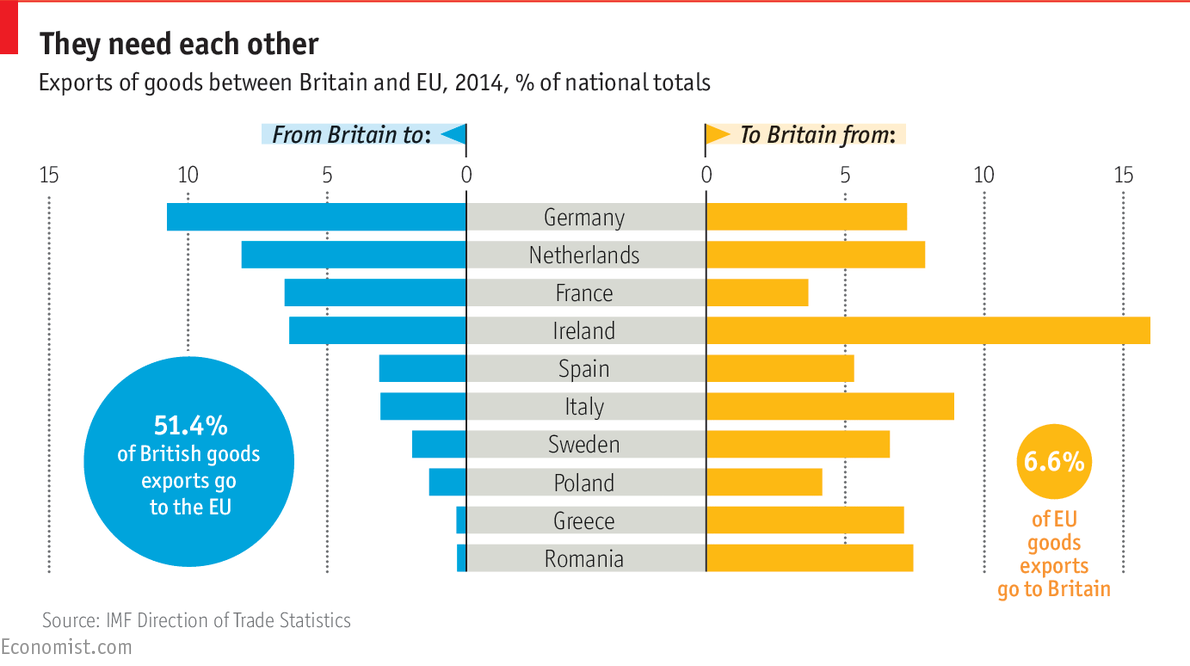 Regulation is perhaps the Eurosceptics' biggest bugbear. When trying to show how much Britain might gain from leaving the EU, they tot up all the costs of EU regulation, assert that there are no benefits from it and assume that, after Brexit, the whole lot could be scrapped. The OECD club of mostly rich countries has compared the extent of regulation in product and labour markets among its members and finds that Britain is among the least regulated countries in Europe.Indeed, Britain compares favourably with non-EU countries such as America, Australia and Canada. And there is little to suggest that, if it were to leave the EU, it would tear up many rules. Moreover, if a post-Brexit Britain wanted to retain full access to the single European market, it would almost certainly have to stick with most of the accompanying rules.
Regulation is perhaps the Eurosceptics' biggest bugbear. When trying to show how much Britain might gain from leaving the EU, they tot up all the costs of EU regulation, assert that there are no benefits from it and assume that, after Brexit, the whole lot could be scrapped. The OECD club of mostly rich countries has compared the extent of regulation in product and labour markets among its members and finds that Britain is among the least regulated countries in Europe.Indeed, Britain compares favourably with non-EU countries such as America, Australia and Canada. And there is little to suggest that, if it were to leave the EU, it would tear up many rules. Moreover, if a post-Brexit Britain wanted to retain full access to the single European market, it would almost certainly have to stick with most of the accompanying rules.
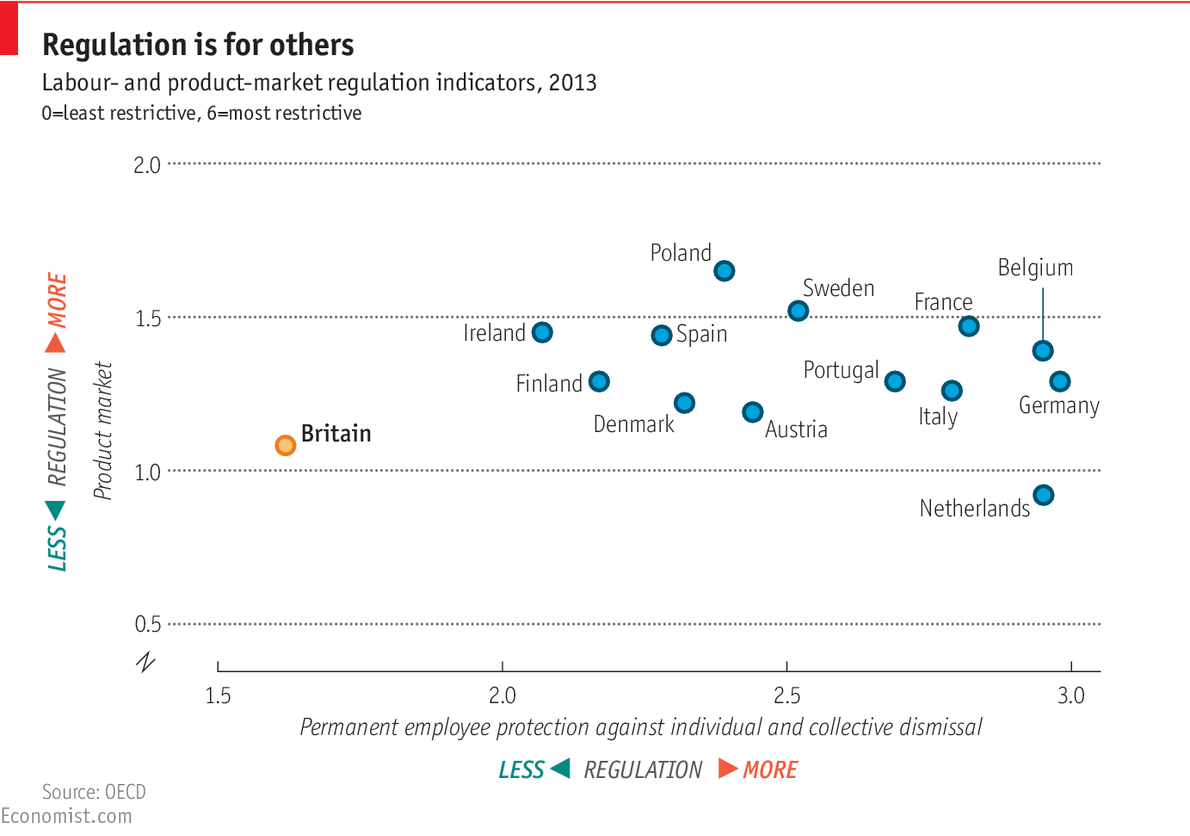 What are the options if Britain decided to leave the EU? Most of the alternatives to full membership are unattainable, unappealing or both. The EU will not disappear as an institution or a big market. A post-Brexit Britain will have to form a set of trading and institutional relationships with it. The uncertainty is over what these would be—and how long they might take to negotiate.
What are the options if Britain decided to leave the EU? Most of the alternatives to full membership are unattainable, unappealing or both. The EU will not disappear as an institution or a big market. A post-Brexit Britain will have to form a set of trading and institutional relationships with it. The uncertainty is over what these would be—and how long they might take to negotiate.
Broadly, there are five models to choose from. The first is to join the European Economic Area, a solution adopted by all but one of the EFTA states that did not join the EU. But the EEA now consists of just one small country, Norway, and two tiddlers, Iceland and Liechtenstein. The second option is to try to emulate Switzerland, the remaining EFTA country. It is not in the EEA but instead has a string of over 20 major and 100 minor bilateral agreements with the EU. The third is to seek to establish a customs union with the EU, as Turkey has done, or at least to strike a deep and comprehensive free-trade agreement. The fourth is simply to rely on normal World Trade Organisation (WTO) rules for access to the EU market. The fifth, preferred by most Eurosceptics, is to negotiate a special deal for Britain alone that retains free trade with the EU but avoids the disadvantages of the other models, but it would be extremly hard or even impossible to negotiate this in an atmosphere, post-Brexit, that would hardly be a warm one.
Audio and Video content on Economist.com requires a browser that can handle iFrames.
In fact Britain has influenced the EU for the better. The European project it joined in 1973 had obvious flaws: ludicrously expensive farm and fisheries policies, a budget designed to cost Britain more than any other country, no single market and only nine members. Thanks partly to British political clout, the EU now has less wasteful agricultural and fisheries policies, a budget to which Britain is a middling net contributor, a liberal single market, a commitment to freer trade and 28 members. Like any club, it needs reform. But the worst way to effect change is to loiter by the exit.
Read more: Our recent Special Report on Britain and Europe

The Economist explains: Why India's monsoon is difficult to forecast

Babbage: What history might tell us about AI

Gun control: Senators fail the American people (again)

Riddance to bad rubbish: Islamic State is still in Fallujah. But the...

Daily chart: Debunking years of tabloid claims about Europe

Britain's EU referendum: Hoping that demography is not destiny

Flying high: A new crop of hands-on universities is transforming how...
http://www.economist.com/blogs/graphicdetail/2016/02/graphics-britain-s-referendum-eu-membership
..


The two campaigns, "Britain Stronger in Europe" and "Vote Leave", that are likely to form the offical lobby groups for each side in the referendum have set out their positions on the main topics that will form the basis for the referendum (see table).




Broadly, there are five models to choose from. The first is to join the European Economic Area, a solution adopted by all but one of the EFTA states that did not join the EU. But the EEA now consists of just one small country, Norway, and two tiddlers, Iceland and Liechtenstein. The second option is to try to emulate Switzerland, the remaining EFTA country. It is not in the EEA but instead has a string of over 20 major and 100 minor bilateral agreements with the EU. The third is to seek to establish a customs union with the EU, as Turkey has done, or at least to strike a deep and comprehensive free-trade agreement. The fourth is simply to rely on normal World Trade Organisation (WTO) rules for access to the EU market. The fifth, preferred by most Eurosceptics, is to negotiate a special deal for Britain alone that retains free trade with the EU but avoids the disadvantages of the other models, but it would be extremly hard or even impossible to negotiate this in an atmosphere, post-Brexit, that would hardly be a warm one.
Audio and Video content on Economist.com requires a browser that can handle iFrames.
In fact Britain has influenced the EU for the better. The European project it joined in 1973 had obvious flaws: ludicrously expensive farm and fisheries policies, a budget designed to cost Britain more than any other country, no single market and only nine members. Thanks partly to British political clout, the EU now has less wasteful agricultural and fisheries policies, a budget to which Britain is a middling net contributor, a liberal single market, a commitment to freer trade and 28 members. Like any club, it needs reform. But the worst way to effect change is to loiter by the exit.
Read more: Our recent Special Report on Britain and Europe
More from the Economist
About Graphic detail
A new chart or map every working day, interactive-data features and links to interesting sources of data around the web
Advertisement

The Economist explains: Why India's monsoon is difficult to forecast
The Economist explains | Jun 23rd, 05:42

Babbage: What history might tell us about AI
Science and technology | Jun 22nd, 17:13

Gun control: Senators fail the American people (again)
Democracy in America | Jun 22nd, 15:53

Riddance to bad rubbish: Islamic State is still in Fallujah. But the...
Middle East and Africa | Jun 22nd, 15:32

Daily chart: Debunking years of tabloid claims about Europe
Graphic detail | Jun 22nd, 15:03

Britain's EU referendum: Hoping that demography is not destiny
Graphic detail | Jun 22nd, 14:54

Flying high: A new crop of hands-on universities is transforming how...
International | Jun 22nd, 14:50
Most commented
Advertisement
Economist blogs
- Bagehot's notebook | British politics
- Buttonwood's notebook | Financial markets
- Democracy in America | American politics
- Erasmus | Religion and public policy
- Free exchange | Economics
- Game theory | Sports
- Graphic detail | Charts, maps and infographics
- Gulliver | Business travel
- Prospero | Books, arts and culture
- The Economist explains | Explaining the world, daily
Products and events
Test your EQ
Take our weekly news quiz to stay on top of the headlines
Take our weekly news quiz to stay on top of the headlines
Want more from The Economist?
Visit The Economist e-store and you'll find a range of carefully selected products for business and pleasure, Economist books and diaries, and much more
Visit The Economist e-store and you'll find a range of carefully selected products for business and pleasure, Economist books and diaries, and much more
Advertisement
..




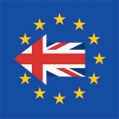


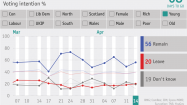




Brak komentarzy:
Prześlij komentarz